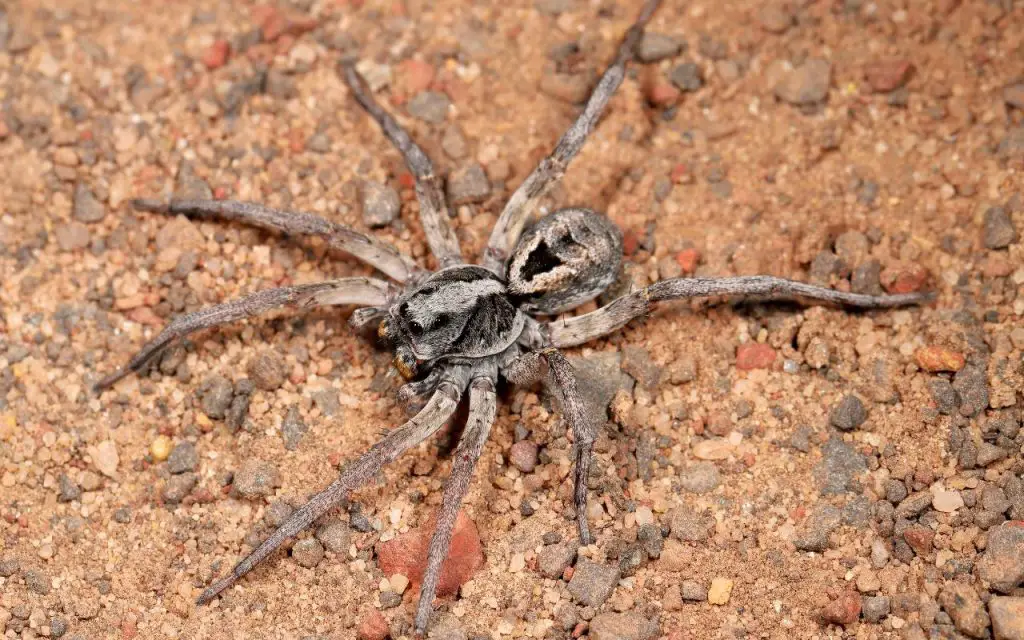Last updated on May 2nd, 2023 at 08:58 am
Do Wolf Spiders bite? Obviously, they can – they’re spiders after all. What you’ll find is that they’d rather run away from humans though…
Wolf Spiders are a widespread, common group of arachnids that rarely (if ever) bite humans. Fortunately, they are a skittish group of spiders that prefers to move away from people, rather than stand their ground. They also have quite weak venom, despite some species being several inches in leg span.
Do wolf spiders jump?
Wolf spiders are capable of jumping and usually do so while capturing their prey. They patiently wait till the prey shows up and then spring on it.
However, the height to which they can jump is fairly low compared to other jumping species of spiders. They display only a minimal ability for pouncing.
Wolf spiders generally do not bother anyone unless they are bothered first. They are gentle beings who scurry away from human beings.
If you encounter them, just make sure to leave them be. They have a tendency to crawl over surfaces quickly and might mistake you for a threat.
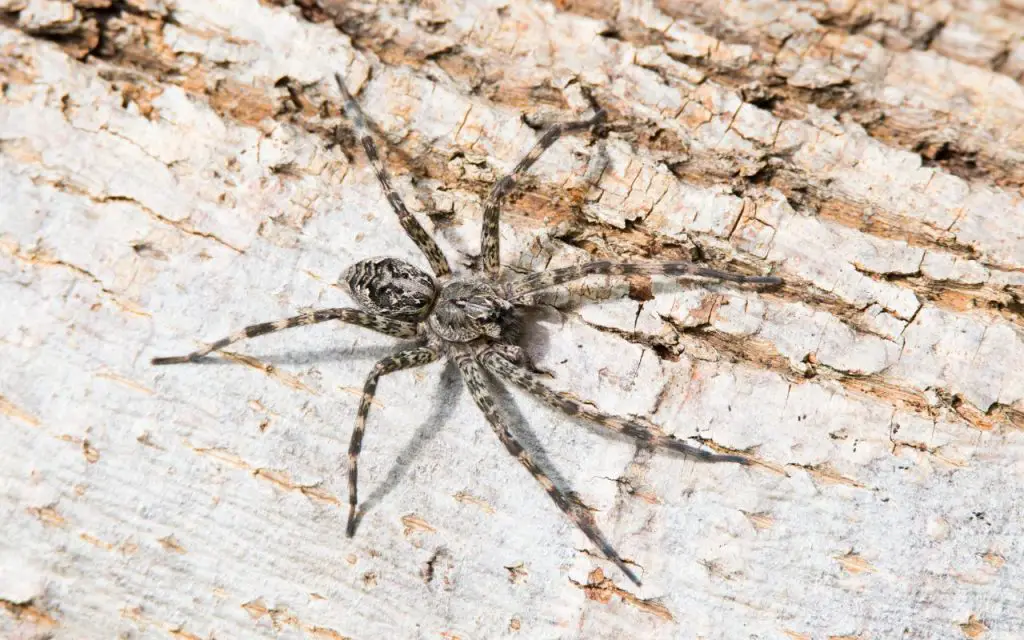
Will a wolf spider bite you in your sleep?
Technically, yes, wolf spiders can bite you when you are asleep or during any other part of the day. However, this is highly unlikely. It would only occur if you rolled over onto one, and they try to avoid us humans anyway.
They are reclusive spiders that dwell in seclusion and generally cause no harm to humans. Even their bite is non-toxic in nature.
A wolf spider bite is a rare occurrence that results from defensive spiders. As long as you do not provoke them, the odds of them biting you remain low.
Their bites are no different from those of insignificant insects. Make sure you cover yourself properly while sleeping to avoid any wolf spiders in your vicinity.
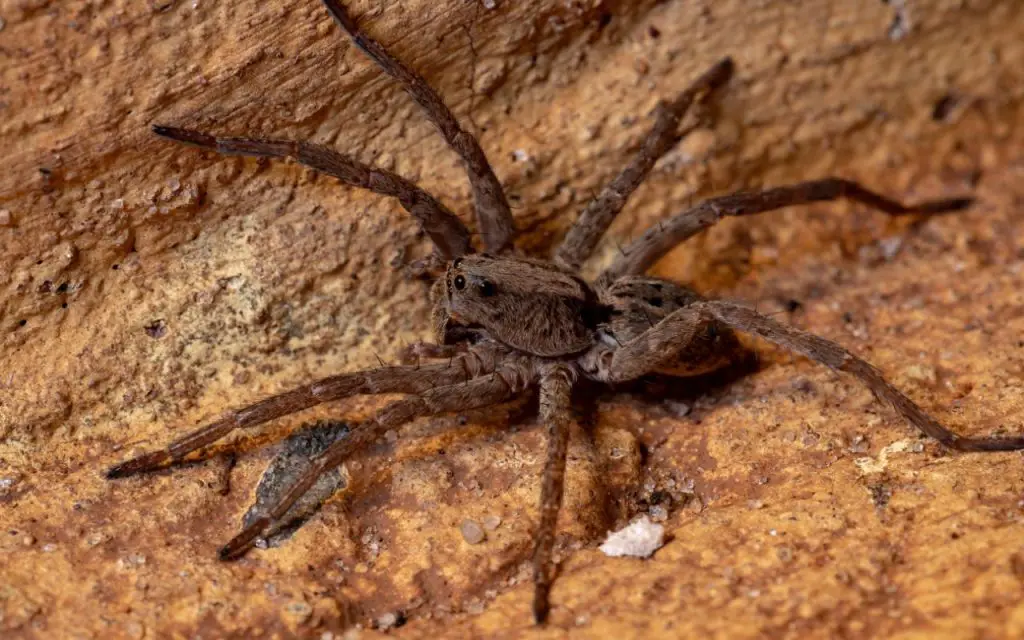
Are wolf spiders good to have around?
Keeping a wolf spider around is a good idea because they provide a lot of advantages to your surroundings. They are an efficient way to keep your garden insect-free.
Wolf spiders love to feast on the likes of roaches, crickets, ants and worms. They sometimes even hunt insects that are bigger than their own stature.
Their existence provides a pest-controlling benefit to the environment. Wolf spiders might be unsociable but they make a great companion to a healthy garden.
You might prefer to keep one around as a pet or an insect-repelling agent. Either way, they will make a great addition to your lawn or garden. It isn’t nicer to have a natural pesiticide, in the form of predators, rather than using chemicals?
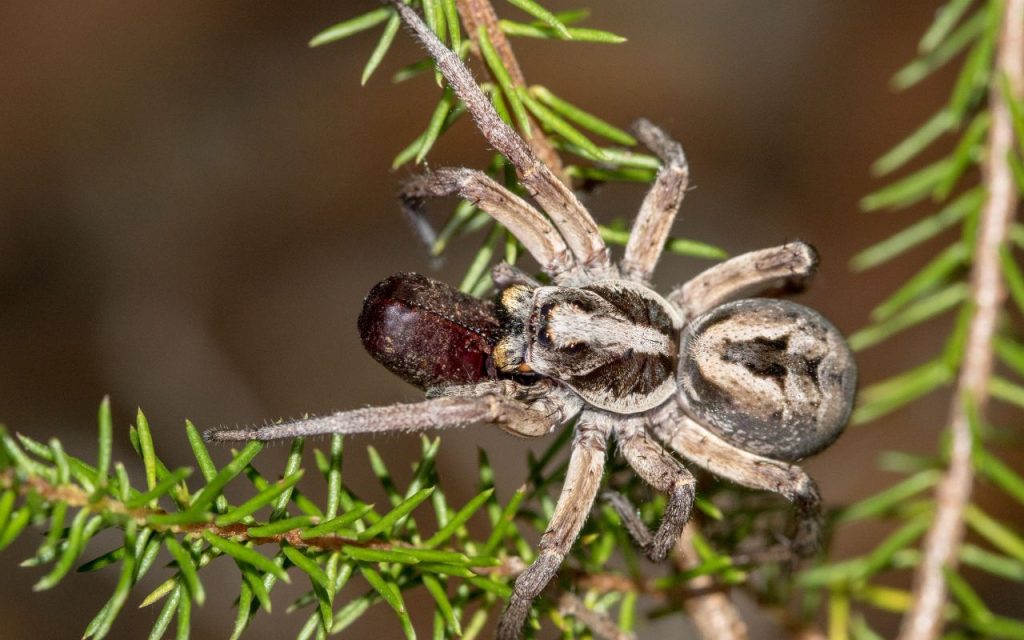
Do wolf spiders bite dogs?
Wolf spider bites on pets are a rare and troublesome occurrence. It is not easy to recognize their bites as they look no different than ordinary insect bites.
Fortunately, their bites are not toxic in nature so watch out for reactions from your dog. Dogs are curious creatures who might disturb their habitat and trigger the bite.
The most common reaction in dogs is developing reddish bumps on the site of the bite. However, some dogs maybe especially sensitive to it.
If you are certain that a wolf spider has bitten your dog, first treat it like how you would any insect bite on your pet.
If the dog is showing any concerning symptoms that indicate a possible allergic reaction, contact a vet immediately. This would include an excessively swollen snout, for example.
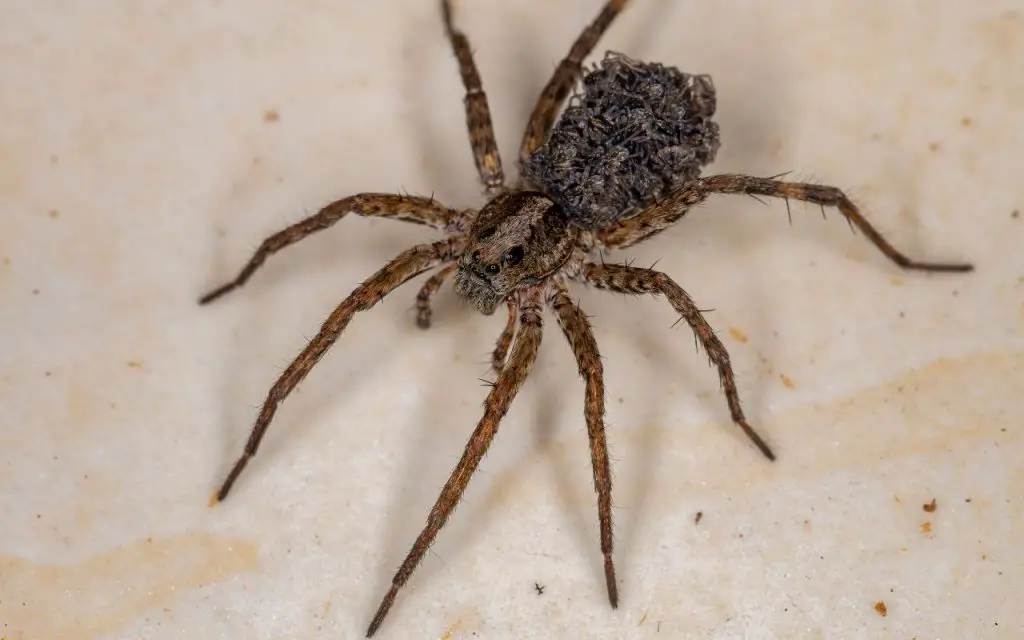
Are wolf spiders poisonous?
No, wolf spiders are not poisonous or venomous. Most people who get bitten by wolf spiders have no lasting symptoms except for ordinary signs like itching or small lumps.
You could also experience a nominal amount of pain or sensitivity that would follow most insect bites. It should be gone after using an icepack and getting some rest.
But it is possible for wolf spider bites to trigger some people’s allergies so observe yourself carefully once you’ve been bitten.
There shouldn’t be any life-threatening symptoms as they are not a noxious group of spiders.
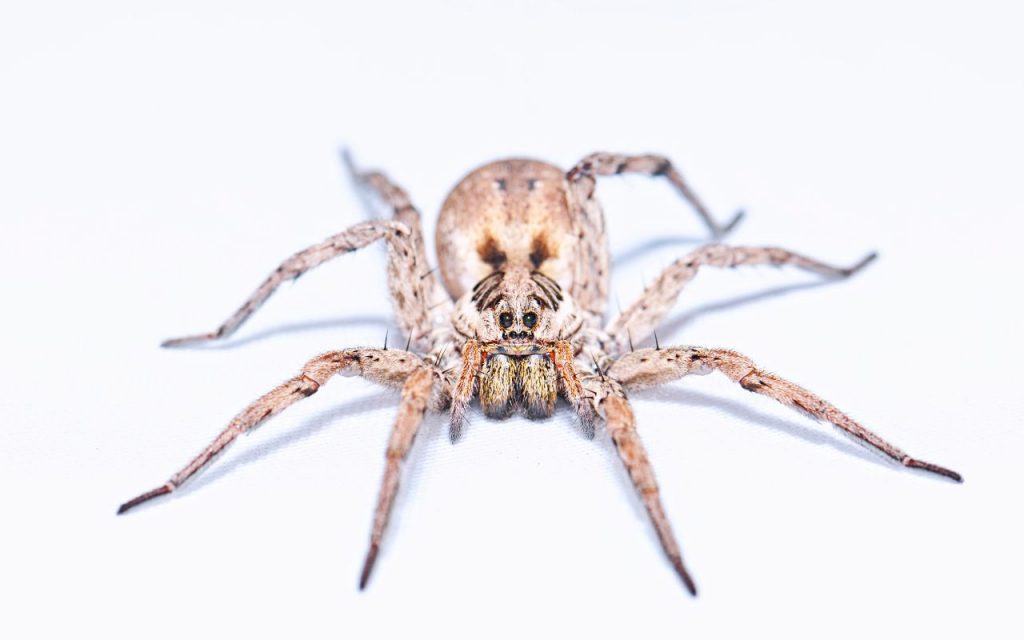
Where do wolf spiders live
The wolf spider’s most preferred habitat includes a wide range of topography. They are commonly found in American and Canadian ecosystems.
Wolf spiders are found almost everywhere. They can be spotted in grassland areas, mountainous regions, dry lands, marshy expanses, and even suburban homes.
They are an omnipresent bunch of spiders who can survive in a spectrum of areas. Wolf spiders can live in most places as long as there are insects around.

Wolf spider size
Wolf spiders have a body size that does not exceed 2 inches, or 5 centimeters, without including their legs. Female spiders tend to be on the bigger side. When you include the legs, some species are as large as 3 or 4 inches, though most of them are actually much smaller than this.
The different genera of the wolf spider have different sizes but most of them are bigger than one centimeter. Male spiders can grow up to 0.8 centimeters.
The size of these arachnids also differs according to the geographical location they reside in. But wolf spiders are a moderately placed species when it comes to spider size.
Their other signature characteristics are dewy luminescent eyes. They have 8 gleaming eyes that jump out at you if you come across them in the woods at night.
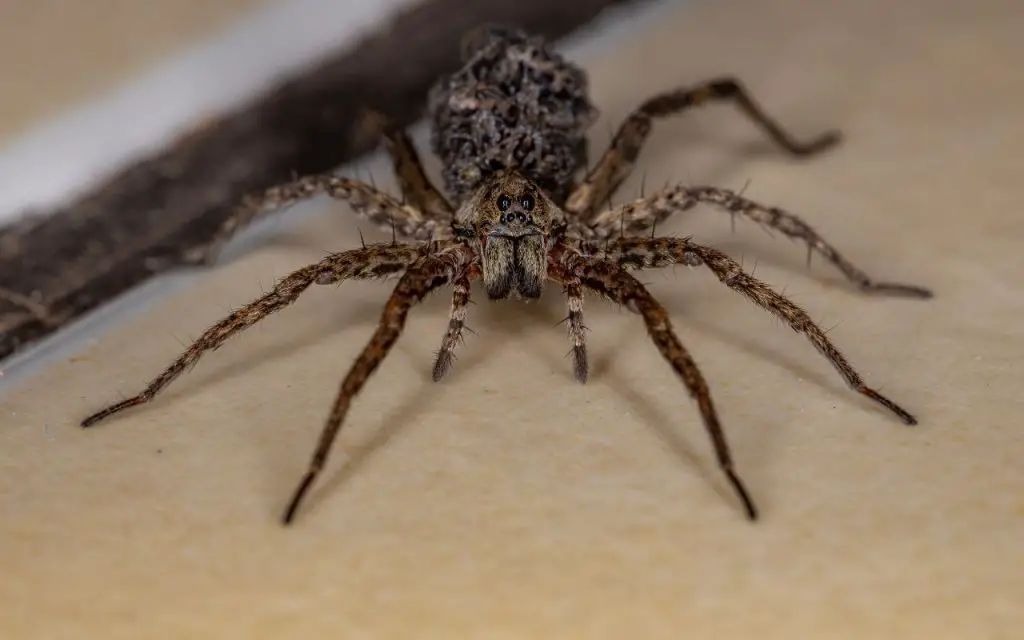
Wolf spider bite treatment
OTC drugs and home remedies are usually enough to treat the bite of a wolf spider. The following are the most common treatments.
- Disinfecting: It is important to sanitize the region of the spider bite and do basic first-aid before you apply anything.
- Icepacks: These are used to help lower symptoms like itching and to soothe the painful area.
- Medication: Your regular anti-allergic and pain medicines can be taken to treat the sensitivity of the inflamed area.
- Oil: Lavender oil or coconut oil have proven to be effective in bringing down the irritation and swollen skin.
- Call your physician: If your symptoms persist and do not recede with time, it is important for you to get the medical advice of a professional.
What time of year do wolf spiders come out?
Wolf spiders love the fall season and you are more likely to find them entering your houses then. This is when they will be trying to escape the cool climate.
They will seek warmth and protection to help them during mating season. You can commonly spot them in the nooks, corners, and crevices of your home.
Wolf spiders are nocturnal creatures who catch their prey in the wee hours when there are no signs of life.
But they can also be found out and about in the daytime, especially next to water sources.
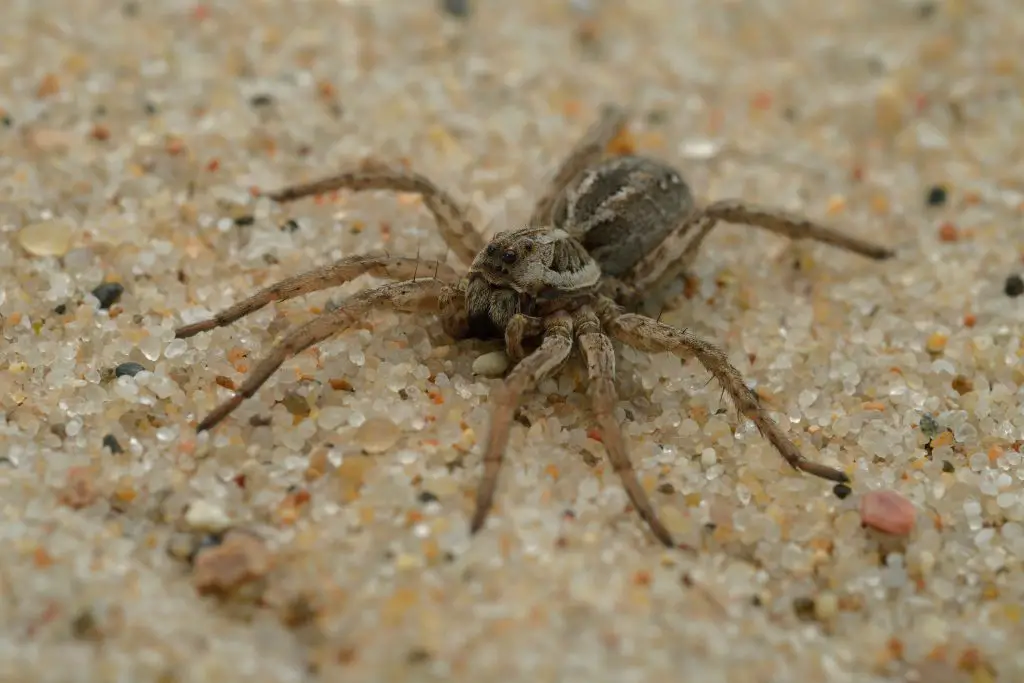
Can I keep a wolf spider as a pet?
Yes, you can and they are an unusual but valuable choice of pets to maintain. Keeping a wolf spider around at home means fewer reinforcements for pest control.
They are benign and bashful spiders that require low maintenance. They will also be able to live longer when they are away from predatory animals.
You have to ensure you are ready to take care of a wolf spider before you decide to adopt one. Learning about their long-term care is vital to ensure their longevity.
FAQ relating to do wolf spiders bite
What attracts wolf spiders in the house?
Generally, all kinds of entry points into a house entice a wolf spider. This means anywhere and everywhere there could be an opening or hole.
Make sure to properly stuff all the crevices in your home to keep them away. They are aversive to many common ingredients such as cedar, peppermint, and cinnamon.
Like many other insects, they are also drawn toward light sources. During fall, make sure to cut back on any insect-attractive lighting on the porch.
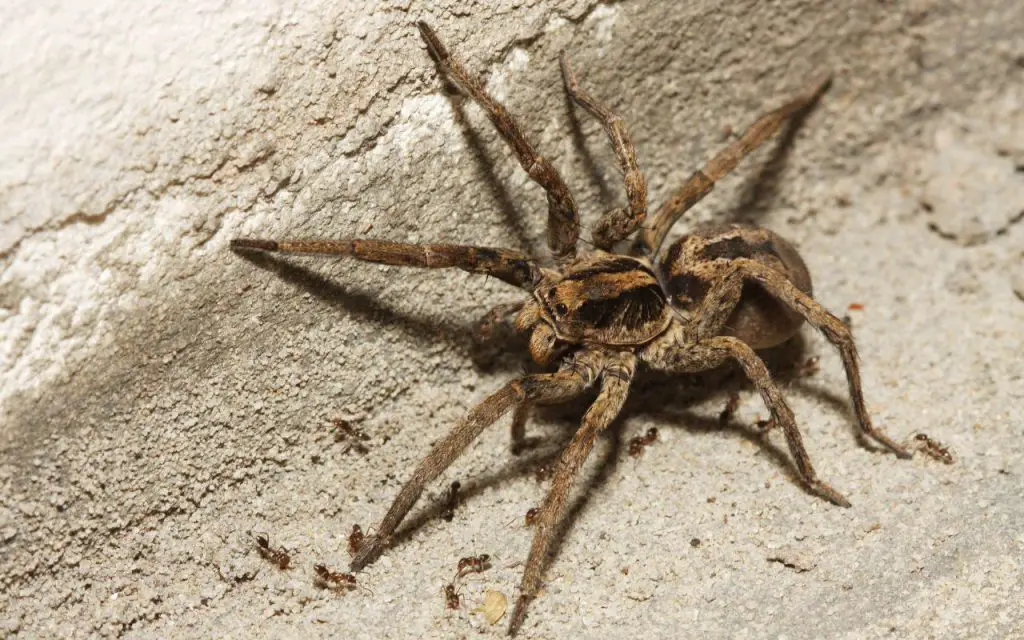
What does a wolf spider bite look like?
The tricky thing about confirming a wolf spider bite is you can be certain only if you saw it biting you. Their bites cannot be distinguished from ordinary bug bites.
A small bite that gives rise to reddish bumps and scratchy sensations are the main characteristics. Typically, it will subside by itself in a couple of days.
The odds of a wolf spider bite also increase if you’re been outdoors. Camping in the forest at night, trekking, and staying near lakes are all red flags that attract wolf spiders.
It is important to get in touch with a medical professional if get a bite and your symptoms continue. Sometimes, you might think it was a Wolf Spider, when it was actually a more dangerous species.
Watch out for the following signs if you are certain or suspect you’ve been bitten by spider:
- Reddening rash
- Increasing scratchiness
- Minimal to moderate pain that doesn’t subside after a few days
- Fatigue
- Rising temperature
- Nausea
Will a wolf spider chase you?
Wolf spiders are meek and innocuous spiders that do not have a threatening existence. They display speed and agility while chasing their prey but don’t lash out at humans.
Unless you antagonize them first, they will not disturb you. The odds are they will be shy to come close to you as their first instinct is to go into hiding.
If they detect they are in danger, they will quickly seek cover and scamper off. If you encounter a wolf spider, it’s best to let it be and not disturb its habitat.
Are wolf spiders aggressive towards humans?
No, wolf spiders do not display aggression toward humans. Very few spiders in the world charge at someone as a defense mechanism.
Wolf spiders are harmless creatures who usually keep to themselves. They like living in shadows and canopied spaces during the day.
Typically most spiders turn hostile only when they sense their existence is in peril. The only way you could get bitten is by inadvertently going near or touching a wolf spider.
Wolf spiders do not possess violent or venomous qualities. But they might be scared if you get too close to them, so ensure a safe distance should you run into them.

